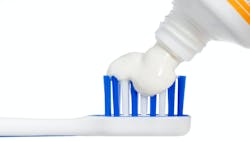A new toothpaste known as INT301 from Intrommune Therapeutics has demonstrated safety and efficacy in helping adult patients with peanut allergies reduce their reaction when exposed to the food, according to the findings of a phase 1 study.1 The 48-week, randomized, double-blind, placebo-controlled trial enrolled 32 adults aged 18–55 with a peanut allergy.
A peanut allergy in this study was defined as:
- Positive skin prick test (SPT) (wheal at least 3 mm greater than control) and/or peanut specific IgE > 0.35 kU/L
- Convincing clinical history of allergic reaction to peanut within one hour of ingestion for at least three months prior to screening
- Failure of an oral food challenge (OFC) of < 100 mg of peanut protein at screening
Study subjects received the test toothpaste as an escalating preset metered dose of INT301 (contains peanut protein) versus a placebo paste for the control subjects. The primary endpoint of the study was safety, measured by the percentage of participants who could consistently tolerate the highest dose of the toothpaste without adverse systemic reactions. The secondary endpoints were to determine the highest dose of the toothpaste that could be given to the subjects and the number of subjects experiencing the need for allergic intervention therapy.
Study findings
- All participants in the treatment arm consistently tolerated the highest dose of the toothpaste with no moderate or severe systemic reactions.
- The main adverse reaction was mild oral itching.
- Treatment adherence was 97%, and there were no dropouts because of the study medication.
You may also be interested in … Millions of people mistakenly think they’re allergic to penicillin
How does the toothpaste work to decrease peanut allergies?
Once the toothpaste enters the mouth, the proteins in the toothpaste bind to oral mucosa. Langerhans cells then pull the protein into the lymph system. The Langerhans cells trigger reeducation of the immune system, and differentiated T cells help desensitize the patient to peanuts. The treatment group also demonstrated a significant increase in sIgG4 (serum immunoglobulin G4) levels relative to control participants and a decrease in the IgE/IgG4 ratio. This is indicative of an immunologic response to treatment with INT301 and efficacy of the toothpaste’s treatment.
Implications of using a toothpaste for peanut allergy treatment
Currently the only options for food allergy treatment and management are to tell patients to completely avoid food types and carry epinephrine. Another option is oral immunotherapy in the form of Palforzia [Peanut (Arachis hypogaea) Allergen Powder-dnfp] or an individualized oral immunotherapy program. The problem with oral immunotherapy is that it’s time-consuming, and there are substantial logistic considerations. A toothpaste offers a simpler option that patients can easily use and fit into their daily schedules.
Michael Nelson, CEO of Intrommune Therapeutics, described next steps for the investigational toothpaste in a press release: “We expect the full dataset of this trial to be reported next year and are focused on carefully designing a phase 2 trial to investigate the efficacy of INT301 in a pediatric study.”
You may also be interested in … Aluminum named allergen of the year and dental restorations can contain aluminum: Explaining this to your patient
Editor’s note: This article originally appeared in Perio-Implant Advisory, a chairside resource for dentists and hygienists that focuses on periodontal- and implant-related issues. Read more articles and subscribe to the newsletter.
Reference
- OMEGA study: a study of the safety and feasibility of up-titration with INT301 in adults with sensitivity to peanut. U.S. National Library of Medicine. ClinicalTrials.gov ID NCT04603300. Updated July 28, 2023. https://clinicaltrials.gov/study/NCT04603300
Scott Froum, DDS, a graduate of the State University of New York, Stony Brook School of Dental Medicine, is a periodontist in private practice at 1110 2nd Avenue, Suite 305, New York City, New York. He is the editorial director of Perio-Implant Advisory and serves on the editorial advisory board of Dental Economics. Dr. Froum, a diplomate of both the American Academy of Periodontology and the American Academy of Osseointegration, is a volunteer professor in the postgraduate periodontal program at SUNY Stony Brook School of Dental Medicine. He is a PhD candidate in the field of functional and integrative nutrition. Contact him through his website at drscottfroum.com or (212) 751-8530.
About the Author

Scott Froum, DDS
Editorial Director
Scott Froum, DDS, a graduate of the State University of New York, Stony Brook School of Dental Medicine, is a periodontist in private practice at 1110 2nd Avenue, Suite 305, New York City, New York. He is the editorial director of Perio-Implant Advisory and serves on the editorial advisory board of Dental Economics. Dr. Froum, a diplomate of both the American Academy of Periodontology and the American Academy of Osseointegration, is in the fellowship program at the American Academy of Anti-aging Medicine, and is a volunteer professor in the postgraduate periodontal program at SUNY Stony Brook School of Dental Medicine. He is a trained naturopath and is the scientific director of Meraki Integrative Functional Wellness Center. Contact him through his website at drscottfroum.com or (212) 751-8530.
